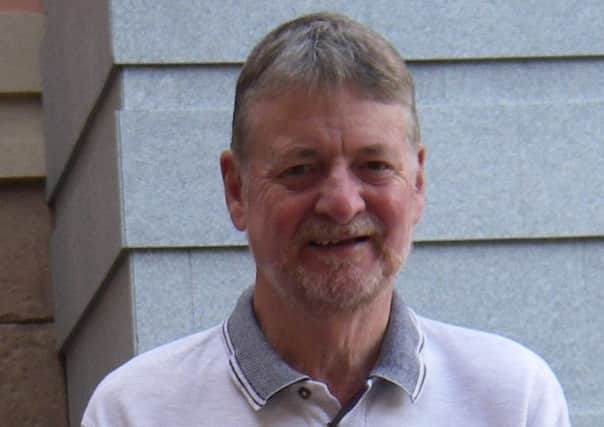Obituary: Alex Wattie, award-winning journalist and broadcaster, sailor and hillwalker


Fires were commonplace in Glasgow which had become known as “tinderbox city” and reporter Alex Wattie was sent out from the office to cover “just another one” in a warehouse on the Southside on 25 August, 1972.
His shift in the Evening Times newsroom was almost over when urgent messages began to crackle over the police and fire radios that the four-storey House of Sher warehouse in Kilbirnie Street was well alight.
Advertisement
Hide AdAdvertisement
Hide AdIt was a blaze, albeit a spectacular one and it was going to destroy a warehouse, but all the staff had been evacuated and there appeared to be no danger to life.
Suddenly however flames began licking along the roof of the building and in less than a minute it collapsed and the old building imploded.
The story would make a picture and a few paragraphs in the paper that night, but Alex Wattie didn’t think it had the “legs” to carry it over into the national morning papers. Five minutes later everything changed. Firemen were missing. Men had been issued with breathing apparatus but had not returned it within the allotted time, and that time had run out.
Seven firemen died in that inferno and, at a commemoration service 40 years later, Wattie recalled: “The entire sequence, from me sitting in the newsroom to the end, would be between 45 minutes and an hour. That was all.
“It happened so very, very quickly. I did not know until afterwards, but I had seen seven men die when the building collapsed.
“I think that is why the incident has remained so vividly with me over 40 years. It isn’t often that reporters witness something on this scale.”
Wattie said had seen a Russian Mig-29 jet crash at the Paris Air Show, in 1989, but that memory had not remained with him as much as that fatal fire in Kilbirnie Street.
Alex Wattie, who has died aged 74, was a Fifer who was born in Dunfermline and brought up in Burntisland where he stayed until he was 17.
Advertisement
Hide AdAdvertisement
Hide AdHis parents were Barbara Doig and Alexander Hall Wattie, Sergeant RA, who after the Second World War became Chief Railway Controller for the east coast of Scotland.
They married in 1942 while his father was home on leave from Egypt and Alex never met his father until four years later when he was demobbed.
His father was part of the team that organised the logistics for the withdrawal of troops when the war finished. Sergeant Wattie didn’t leave Egypt until all the troops were home from the Middle East/Africa. His last military task was to book himself on the last troop ship home.
Alex Wattie remained an only child and was educated at Burntisland primary school and Kirkcaldy High School. Like most journalists in that era, he did not go to university. He worked his way up the old-fashioned way, starting out on local newspaper, the Fife Free Press, and learned his craft from the bottom up.
On leaving school, he had worked for the Ministry of Defence initially for about three years in the armaments department at Gosport in Hampshire, but he damaged his hearing and left on medical grounds.
Wattie moved back home to Scotland and took up journalism which had been his first love since he had won an essay-writing competition for The Scotsman where he worked as a copy boy on job experience. This confirmed his love of writing and set him on the path to a successful career in journalism.
Alex Wattie worked for the Evening Times, the Scottish Daily Express, the Press Association and BBC Radio Scotland.
He later specialised as an industrial correspondent for The Scotsman and, in a second stint at the BBC, as Radio Scotland business correspondent.
Advertisement
Hide AdAdvertisement
Hide AdFormer colleagues said he would be remembered for his meticulous accuracy and the seriousness with which he approached the job.
He covered effectively the demise of heavy industry in Scotland including the closure of Ravenscraig steelworks and the Linwood car factory; the miners’ strike and the work-in at Upper Clyde Shipyards.
Wattie loved ships and all things that sailed. He had close contact with leading trade unionists including Jimmy Reid.
He moved to BBC Radio Scotland as Business Affairs Correspondent and appeared regularly on both television and radio. In 1990 he won the IPR award for best Scottish Radio Business Journalist Award and in 1991 the award for best Radio Journalist. His daughter, Helen, said: “Whilst not a limelight man, he was secretly quite pleased!”
In retirement, he loved hill walking and sailing. He had a yacht which he and Joan sailed up the west coast of Scotland at every opportunity.
He was also a volunteer tour guide at the Fairfield Shipyard Museum in Govan which took him back to his love of the shipyards. He enjoyed this immensely as he did travelling and spending as much time with his grandchildren as he could. He was an avid reader and devoured books, especially biographies of world leaders and a special interest in naval history.
Alex Wattie leaves a son, Andrew, daughter Helen, and three grandchildren. His wife Joan, whom he married at St Columbus Parish Church in Burntisland in 1973, died three years ago. His funeral took place at Glasgow’s Linn Crematorium.
BILL HEANEY